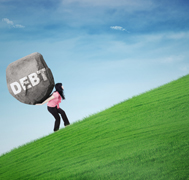Dealing with Income Tax Debt – What Happens if You Owe?
 The income tax filing deadline is April 30th, and that means, if you owe a tax debt to the Canada Revenue Agency (CRA), you may be wondering what happens when you owe and how long you’ve got before the CRA will start asking for their money.
The income tax filing deadline is April 30th, and that means, if you owe a tax debt to the Canada Revenue Agency (CRA), you may be wondering what happens when you owe and how long you’ve got before the CRA will start asking for their money.
Firstly, failing to file is never a good idea, even if you know you will owe. Failing to file will result in penalties and interest, as well as possible enforcement action. These add up quickly. If you haven’t filed yet, try to do so soon.
Furthermore, not filing may be considered tax evasion. At the very least, you may be notionally assessed, meaning the government will estimate your income and then assess penalties and interest. The worst-case scenario, if you choose not to file, is that you could be prosecuted.
If you file and owe a tax debt, you’re in a better position because you won’t have those added penalties and you won’t face prosecution. However, the CRA won’t wait for years to pass before attempting to collect. We have seen taxpayers’ accounts frozen within the current tax year. For example, one taxpayer filed on time, owed $3000, and had their account frozen the following January.
A tax debt is a financial problem that should be addressed quickly – you can’t wait around hoping for the best. There really is no ‘best’ here.
The CRA will want to be paid in full. Agents are not interested in making negotiated settlements or agreeing to long-term payment plans. That just isn’t how they operate, no matter how dire your situation is. If you don’t have the money on hand to pay in full, here are some of your financial options:
- If you have good credit, you may want to consider obtaining a line of credit or loan from the bank. This option will rely on your ability to repay that debt, but on more reasonable terms. However, if you are already loaded with debt, it may not be the best solution because the interest is higher on unsecured credit.
- Use home equity to finance the tax debt. This is typically the lowest interest option but you will need a home and some equity to take this route.
- A consumer proposal. This is a no-interest option that will offer a low monthly payment and will sometimes even reduce your amount of total debt. There are some implications to credit to be considered, but if you’re already drowning in debt it could represent the best financial option overall.
The best way to deal with a tax debt you can’t pay in full is to speak with a financial consultant who understands all of your available options. Don’t go directly to the CRA as this will result in far fewer possible choices and things could become even more problematic as far as repayment.
At DebtCare, we can walk you through all of your options and get that tax debt off the table.
Call us today for a free consultation: 1 (888) 890-0888.


